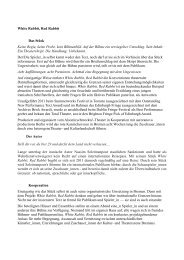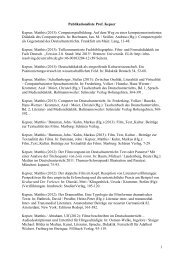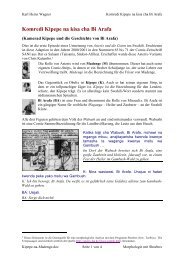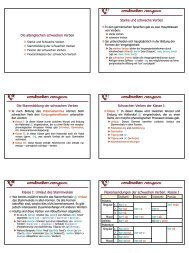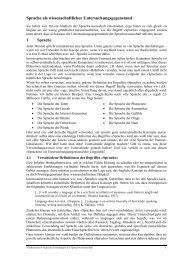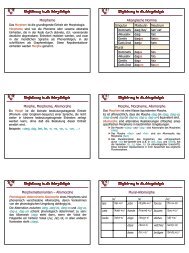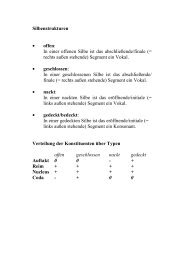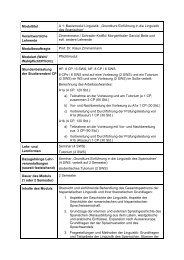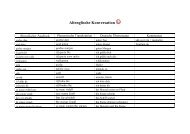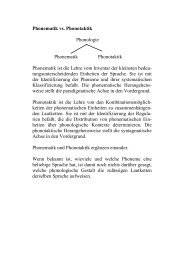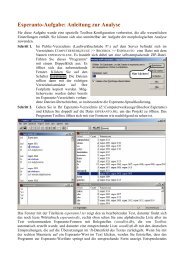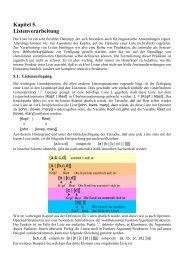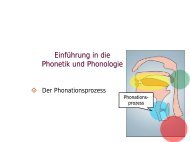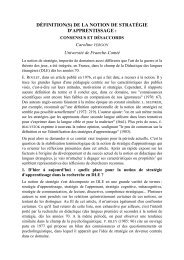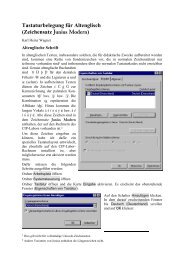Relativism and Universalism in Linguistics - Fachbereich 10 ...
Relativism and Universalism in Linguistics - Fachbereich 10 ...
Relativism and Universalism in Linguistics - Fachbereich 10 ...
Create successful ePaper yourself
Turn your PDF publications into a flip-book with our unique Google optimized e-Paper software.
176 Workshops<br />
The proper analysis of what I will call “quotative constructions” <strong>in</strong> Spanish has, I th<strong>in</strong>k,<br />
important consequences for the cartography of the left periphery (Rizzi 1997 <strong>and</strong> subsequent<br />
work), as well as for the LF representation of some f<strong>in</strong>ite dependencies, such as the well<br />
studied double-complementizer structures <strong>in</strong> Spanish (Plann 1982, Uriagereka 1988, Brucart<br />
1992, Suñer 1993, Rivero 1995, Lahiri 1991, 2002).<br />
Scope Effects <strong>in</strong> Exclamative Sentences<br />
González, Raquel<br />
Madrid<br />
This talk deals with the (im)possibility of negat<strong>in</strong>g exclamative sentences <strong>in</strong> Spanish (cf.<br />
Masullo 2005, Villaba 2004): while quantitative exclamatives can be negated, qualitative<br />
exclamatives cannot. I show that the constra<strong>in</strong>ts on the presence of negation <strong>in</strong> exclamative<br />
sentences follow from scope relations established between the wh-phrase <strong>and</strong> negation. I<br />
provide evidence for the syntactic reconstruction approach to derive these scope relations.<br />
My proposal is that negation can appear <strong>in</strong> exclamative sentences when it does not take scope<br />
over the wh-phrase; when the wh-phrase is with<strong>in</strong> the scope of the negative operator, the sentence<br />
is ungrammatical because the degree quantifier is a Positive Polarity Item (PPI). One of the<br />
differences between qualitative <strong>and</strong> quantitative quantifiers is the scope relations these types of<br />
operators establish. Qualitative quantifiers always have narrow scope with respect to other<br />
operators (cf. Heim 2000, Kennedy 1997), <strong>and</strong> exclamative ones do not behave differently.<br />
F<strong>in</strong>ally, I explore how the scope relations established between two operators, such as negation<br />
<strong>and</strong> exclamative wh-phrases, are derived from the syntax (cf. Hornste<strong>in</strong> 1995, 1999, Szabolcsi<br />
1997). The relation where the wh-phrase has wide scope is obta<strong>in</strong>ed by the surface l<strong>in</strong>ear<br />
order of these operators, but the situation is different when the wh-phrase has narrow scope. I<br />
argue that <strong>in</strong>verse scope is obta<strong>in</strong>ed through syntactic reconstruction of the wh-phrase (cf.<br />
Agüero-Bautista 2001, Fox 2000). Reconstruction consists of <strong>in</strong>terpret<strong>in</strong>g the lowest (or the<br />
<strong>in</strong>termediate) copy of the wh-phrase. When this operator has wide scope, the highest copy is<br />
<strong>in</strong>terpreted by the semantic <strong>in</strong>terface.<br />
Introductory Remarks<br />
Grohmann, K. K. / Tsimpli, I.-M.<br />
University of Cyprus / University of Thessaloniki<br />
kleanthi@ucy.ac.cy;imt@enl.auth.gr<br />
This workshop aims to address the question of form <strong>and</strong> function <strong>in</strong> l<strong>in</strong>guistic phenomena<br />
which <strong>in</strong>volve the left periphery of the clause, i.e. phenomena which typically subsume an<br />
<strong>in</strong>terface level between syntax <strong>and</strong> discourse. Such phenomena readily lend themselves to<br />
functionalist approaches as they are heavily semantically <strong>and</strong> discoursally marked.<br />
Universalist accounts of the generative tradition, on the other h<strong>and</strong>, regard such phenomena as<br />
be<strong>in</strong>g driven by formal operations which are <strong>in</strong>herent properties of natural languages, such as<br />
agreement or movement relations which, when applied to the higher layer of clause structure<br />
(i.e. the left periphery), render the grammatical features <strong>in</strong>volved ‘visible’ by the <strong>in</strong>terpretive<br />
component as discourse-related features. (For a nice overview of both positions, see e.g.<br />
Hammond, Moravcsik & Wirth 1988.)<br />
<strong>Universalism</strong> suggests that form <strong>and</strong> function <strong>in</strong>teract at some level, but function does not<br />
determ<strong>in</strong>e form, <strong>and</strong> form is generated <strong>in</strong>dependently of function. On the other h<strong>and</strong>,<br />
relativism typically assumes a stronger <strong>in</strong>teraction between form <strong>and</strong> function, with function



